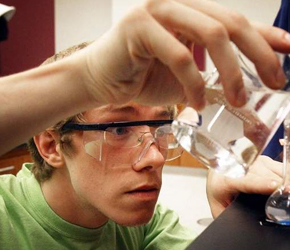Analytical Chemistry Degree
In Analytical chemistry, people gain knowledge of the constituents of matter, their properties and their composition in the universe. Scientists that work to find facts about the structure and composition of matter are known as analytical chemists. Courses in analytical chemistry help the student to know how to conduct qualitative and quantitative tests, verify their analysis by using standard methods, interpret their discoveries and separate compounds/mixtures based on the properties of individual elements.
Anybody who successfully graduates with a degree in analytical chemistry can work as chemists in industries that make use of models to analyze results obtained from government laboratories as well as those that are used in chemical industries, pharmaceutical industries, biotechnology industries and food processing industries. Analytical chemists are also responsible for ensuring that the quality of food products and water is maintained. Many of them work with environmental protection agencies and health institutions where they help doctors diagnose diseases.
Top Schools for Getting a Degree in Analytical Chemistry
According to the US News and World report, the following schools are the top 10 in providing analytical chemistry degree programs:
- University of North Carolina, Chapel Hill
- Purdue University, West Lafayette
- Indiana University, Bloomington
- University of Illinois, Urbana-Champaign
- University of Texas, Austin
- University of Arizona
- University of Michigan, Ann Arbor
- University of Florida
- University of Washington
- University of Wisconsin, Madison.
Students that get their degrees from these schools usually compete more favorably with their colleagues for jobs.
What You Will Learn when you enroll for a Degree in Analytical Chemistry
A fresh student in analytical chemistry begins by learning how to analyze and measure samples. Most of the courses he is introduced to in his first few months are not different from what other chemistry students learn. Other courses that analytical chemists take include quantitative analysis, chemical analysis, instrumental analysis and many other courses that help them understand several analytical procedures. Since the analytical chemist must be trained in other aspects of chemistry, he will have to take courses such as:
- General chemistry
- Organic chemistry
- Physical chemistry
- Analytical chemistry
- Inorganic chemistry
- Calculus
- Technical writing
- Physics and
- Biochemistry
What Do Analytical Chemists Earn?
In 2008, the United States Bureau of Labor Statistics stated that chemists earn an average of $66,230 per year. About 50% of analytical chemists earn between $48,000 and $89,000 while about 10% earn more than $113,000. In 2009, the National Association of College and Employers reported that graduate employees earn an average of $37,000 in their first year. Analytical chemists that earn higher than the rest are usually found in companies that deal with research and development. According to the bureau, it is expected that the employment rate for chemists will increase by 3% before the end of 2018. Most of the positions in research and development are occupied by analytical chemists with advanced degrees such as doctorate. Chemists in the US held about 84,000 jobs in 2008.

